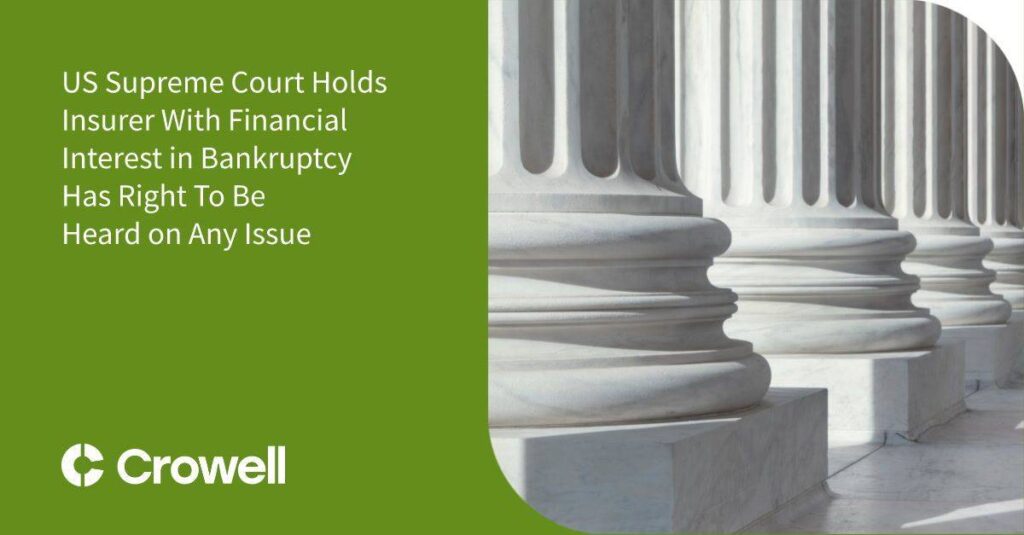Supreme Court Ruling on Insurer’s Role in Bankruptcy
On June 6, 2024, the U.S. Supreme Court delivered a unanimous decision in Truck Insurance Exchange v. Kaiser Gypsum Co., Inc., No. 22-1079, establishing that an insurer responsible for bankruptcy claims qualifies as a “party in interest” in Chapter 11 bankruptcy cases. The Court found that the “insurance neutrality doctrine,” previously applied by lower courts, was insufficient for determining the standing of insurers.
Justice Sotomayor presented the opinion of the Court, with all justices participating except Justice Alito, who abstained from the case’s consideration and decision. The Court’s decision was influenced by an amicus brief submitted by Crowell on behalf of the American Property Casualty Insurance Association (“APCIA”) and the Complex Insurance Claims Litigation Association (“CICLA”).
Truck Insurance Exchange (“Truck”) serves as the primary insurer for Kaiser Gypsum Co. (“Kaiser”), known for its manufacture of asbestos-related products. Due to facing numerous lawsuits related to asbestos, Kaiser, along with its parent company Hanson Permanente Cement, Inc. (“Debtors”), opted for Chapter 11 bankruptcy to address their liabilities. The Debtors, along with representatives from current and future asbestos claimants, various creditors, government agencies, and some insurers (excluding Truck), proposed a reorganization plan, which Truck contested.
Truck challenged the proposed plan, asserting it was a collusive arrangement between the Debtors and claimants’ representatives. The insurer argued that the plan exposed it to extensive fraudulent claims due to insufficient disclosures regarding both insured and uninsured claims, and it would diminish Truck’s rights under existing insurance policies.
The District Court upheld the plan, referencing the “insurance neutrality” doctrine to determine that Truck did not qualify as a party in interest under 11 U.S.C. § 1109(b) and therefore lacked standing to object, reasoning that the plan did not increase Truck’s liabilities or impair its existing contractual rights. The Fourth Circuit affirmed this interpretation, leading the Supreme Court to grant certiorari and reverse the decision.
The Supreme Court emphasized that the language, context, and history of Section 1109(b) affirm that insurers financially liable for bankruptcy claims are indeed “parties in interest,” as they may be substantially impacted by reorganization plans. The Court noted that Congress intended for “party in interest” to encompass a broad range and that Section 1109(b) aims to foster a fair reorganization process.
The Court highlighted the various ways an insurer’s interests could be affected during bankruptcy. Citing the amicus brief from APCIA and CICLA, it remarked on how reorganization plans might undermine an insurer’s ability to manage settlements, restrict its capacity to seek contributions from other insurers, or become collusive, complicating the insurer’s financial obligations while fostering fraudulent claims. The Court ultimately dismissed the “insurance neutrality doctrine” as overly restrictive and impractical, affirming that insurers with financial responsibilities for claims are not merely “peripheral parties.”


